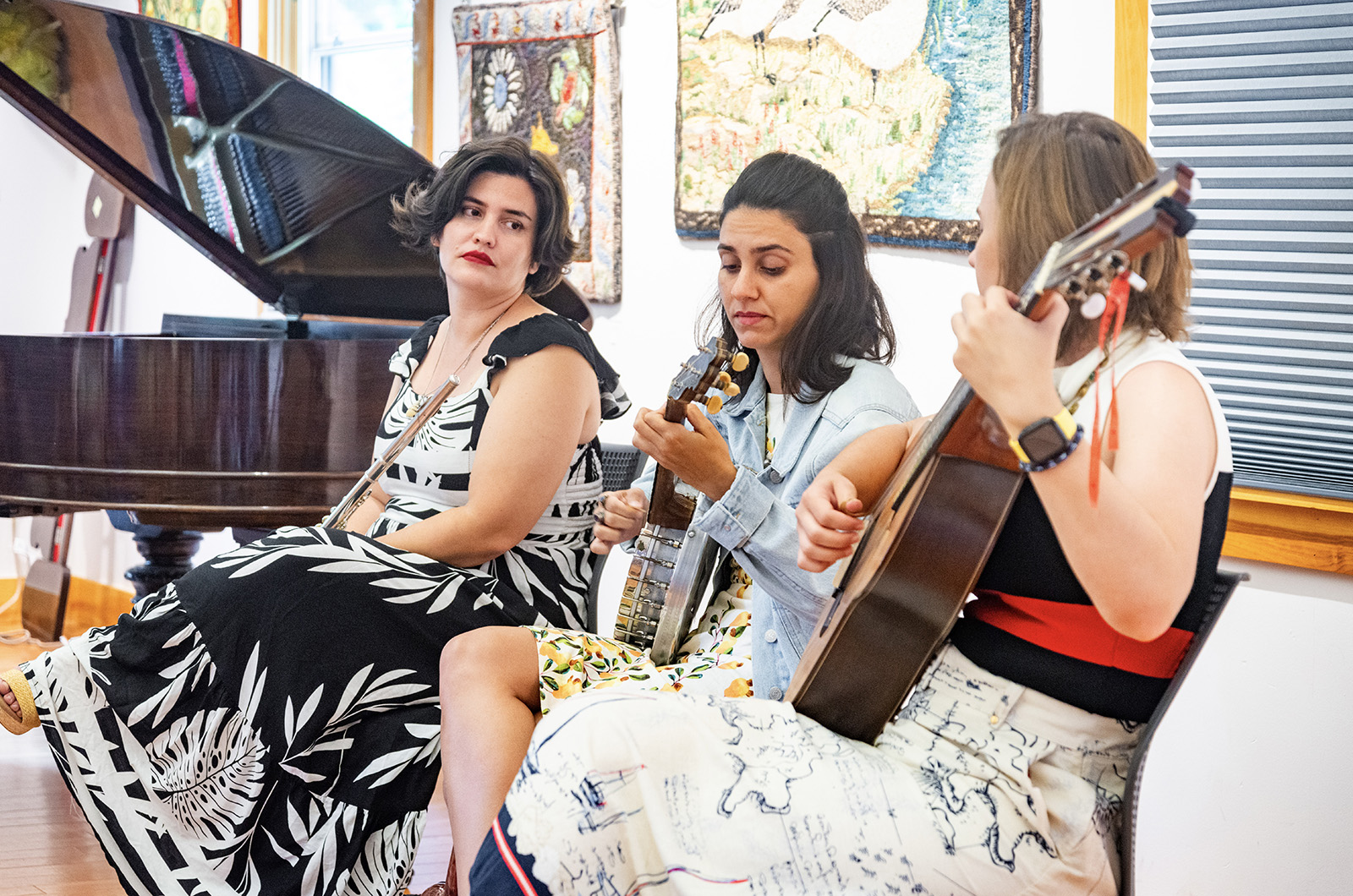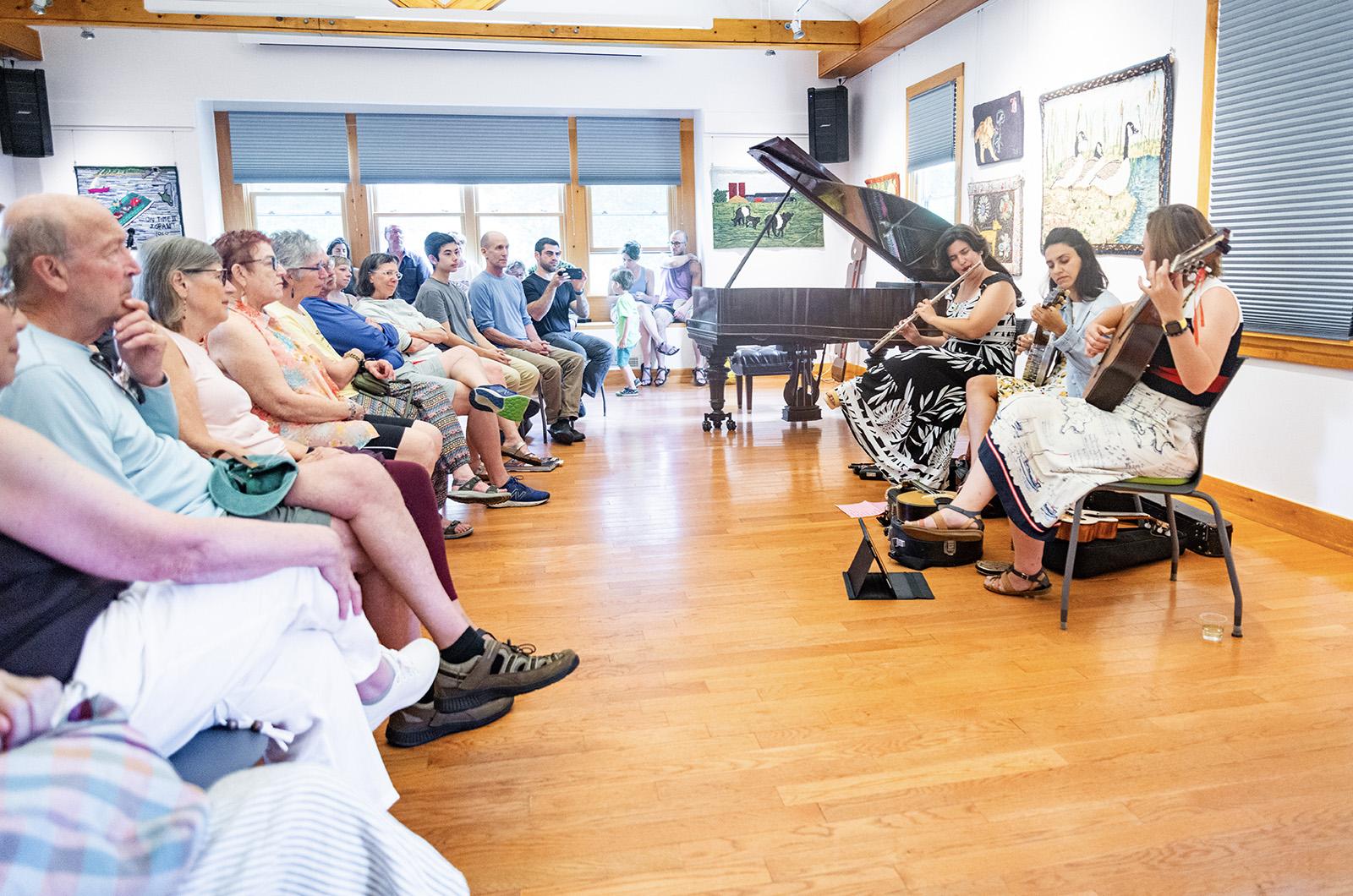Brazilian trio Choro das 3’s first Island concert since 2019 filled every seat at the West Tisbury Library Saturday and had more people listening from the doorway.
Three Sao Paulo-area sisters who have played music together since they were little girls, Choro das 3 began appearing annually at the library about eight years ago, after they and their father was befriended by West Tisbury piano technician David Stanwood and his family.
“They became part of our family,” flutist Corina Meyer Ferreira told Saturday’s audience.

Mr. Stanwood not only picked the group up at the ferry for that day’s concert, but had already tuned the library piano for them.
“This place is very special,” she said.
The onset of Covid in 2020 brought an end to the annual Island concerts, and also took the life of the sisters’ father Eduardo, who died of the virus, she said.
All three musicians’ eyes glistened with tears as they played a song in their father’s memory, with Ms. Meyer Ferreira playing the pandeiro (Brazilian tambourine) that Eduardo had always used to accompany his daughters in concert.
“We are musicians, so we are extra emotive — plus, we are Brazilians,” she said.
“And we are playing a music that is literally called ‘cry,’” added guitarist Lia Meyer Ferreira, referring to the word “choro,” which translates as a cry or lament.
But choro music itself is generally uptempo, often lighthearted and — in the hands of this trio — frequently dazzling, with flights of dancing flute, lightning-fast strings and irresistible meters that had audience members bouncing in their seats, then jumping to their feet for a standing ovation.
After more than 20 years as a performing ensemble, the Meyer Ferreira sisters have honed their techniques while retaining the spontaneous joy of playing what they consider Brazil’s first urban music.
Choro, Corina Meyer Ferreira explained, arose when traditional African and native Brazilian rhythms melded with imported European musics in the 19th century.
It was an album by flutist Altamiro Carrilho that sparked a young Corina Meyer Ferreira’s fascination with choro and led her to pick up the instrument herself, she told Saturday’s audience.
Encouraged by their father, younger sisters Lia and Elisa soon joined in, forming Choro das 3 when Elisa was 9, Lia 12 and Corina 14 years old.
While Corina focused on flute and piccolo — both of which she played Saturday — and Lia on the seven-stringed acoustic guitar, Elisa Meyer Ferreira is the family’s multi-instrumentalist, switching between mandolin, tenor banjo, accordion, piano and cavaco.
The latter, Elisa Meyer Ferreira said, is Brazil’s equivalent of the Hawaiian ukulele: an adaptation of the braguinha, a portable guitar-like instrument that traveled the world with Portuguese mariners and found new identities in lands far from home.
Along with works by Mr. Carrilho and other choro masters such as Benedito Lacerda, the sisters also played their own compositions.
Saturday’s one piano work, an impressionistic solo composed and performed by Elisa Meyer Ferreira, was originally written on an old Chickering piano that Mr. Stanwood tuned daily while the group was staying on Cape Cod in pre-pandemic times, Corina Meyer Ferreira said.
Saturday’s concert was part of a year-long North American tour in which the Meyer Ferreira sisters are barnstorming the continent in a motorhome with their mother Cristina, two small dogs and Elisa Meyer Ferreira’s boyfriend, who doubles as roadie for her many instruments.
Their next scheduled concert is July 27 at Club Passim in Cambridge, followed by an appearance at the Long Island Bluegrass and Roots Festival in Copiague, N.Y. August 19.







Comments (1)
Comments
Comment policy »